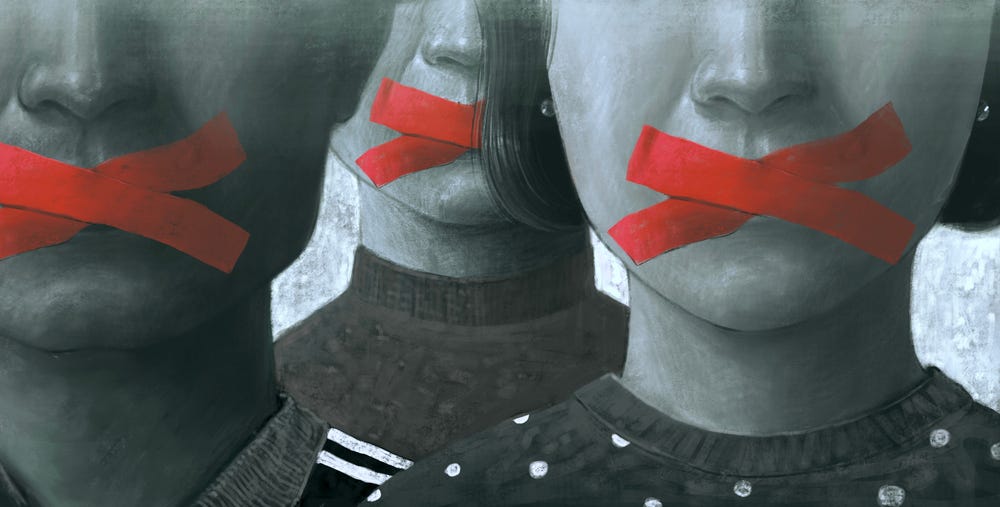E-Pluribus | August 16, 2022
Defund the thought police, conservative wokeness, and elitism hits the panic button.
A round-up of the latest and best writing and musings on the rise of illiberalism in the public discourse:
Jack Fowler: Sue the Thought Police
At National Review, Jack Fowler writes about Speech First, an organization in the mold of the Foundation for Individual Rights & Expression (formerly “Education”) dedicated to fighting censorship on campus and in the courts. As schools continue to institute “bias-reporting systems” to monitor “hate speech,” Speech First is there to stand up for students’ First Amendment rights.
Like the other leftist-inspired abbreviations that infest the American political, academic, cultural, and corporate scenes — BDS, SEL, CRT, SRI, ESG, and BLM — “BRS” [bias-reporting systems] has become a dominant and disturbing presence on college campuses. Public, private, or religious, no matter if located in the reddest of states, BRS has proven viral. Siting itself in a school’s hospitable “diversity, equity, and inclusion” offices, and nourished by unwitting alumni funds and tax dollars, BRS is a stew of protocols, rules, no-no listings, and punishments that conspire to investigate and adjudicate “bias incidents.” Which are? How about speech motivated by someone’s “intellectual perspective” (courtesy of the University of Mississippi) or “perceived political ideas” (so say the proletariat vanguardians at Eastern Mennonite University)?
Beyond the investigating (duties lustfully performed, at the University of Tennessee, by its “Bias Education and Response Team,” which sounds a smidge less scary than the University of Maryland’s “Hate-Bias Response Team”), there is the intimidating — inherent to the enterprise. Bias-reporting systems, by their existence, are institutional deep freezers that create those “chilling effects” on campus speech. They are the instigators of the cautionary thought Should I risk speaking up in the first place? Which is why the foes of BRS, including admirable organizations such as FIRE (newly reminted as the Foundation for Individual Rights and Expression), charge that it prevents students and professors — from the non-woke to the surely conservatives to the leave-me-aloners — from voicing opinions, or even telling jokes, lest they get caught up in a crypto-Soviet dragnet (anonymous accusers, no due process) with an array of consequences: hostility, reprimands, suspensions, the boot, and finding themselves at the dangerous intersection of Here’s My Opinion and You’re Unhireable after Graduation.
[ . . . ]
As it chills speech, from political to happenstantial, BRS also suppresses diversity — of thought. Which seems the point, after all: to do away with “on the other hand,” a thing central to academic debate and classroom exploration of thought, yet now intolerable and impermissible on many a campus.
Read it all.
Michael R. Bloomberg: Republican Censorship Goes for Woke
The former mayor of New York City, Michael Bloomberg, has not exactly ingratiated himself to a lot of Republicans over the years, so his charges of “wokeness” leveled at Ron DeSantis aren’t likely to improve his standing. In the Wall Street Journal, Bloomberg says that it doesn’t matter which side is doing it, the government trying to control speech is not the American way.
Free inquiry and discourse—including professing ideas and beliefs—lie at the heart of higher education and democratic society. In both the sciences and humanities, rigorous debates based on facts, data and reason allow ideas and theories to be evaluated and amended, adopted and discarded, in ways that promote understanding, advance knowledge and teach responsible citizenship.
Yet Florida’s law abandons this ideal by seeking to proscribe what professors can say on particular topics. Universities could be held liable, for example, if a professor expresses support for affirmative action. Remember when Republicans believed in limiting tort laws, rather than expanding them?
The law also applies to companies, as though government should be micromanaging the curriculum of diversity-and-inclusion programs. Similar liability laws have made their way through Republican legislatures in Idaho, Iowa and North Dakota this year, with more potentially on the way. What happened to Republican support for free enterprise?
The way to address controversial theories isn’t by banning professors or business leaders from espousing them to students and workers—after all, government censorship of ideas often helps them gain popularity. Instead, it’s to allow citizens to give them a free airing, where they can be openly debated. That’s the American way, and the future of the country rests in no small part on the commitment of higher-education leaders to defending it.
Read it all here.
Martin Gurri: The Elite Panic of 2022
The onset of the pandemic in 2020 also saw an escalation in the conflict between the elites — as embodied in this case as mainly progressive politicians and public health officials — and the rest of us. Martin Gurri at City Journal writes that 2022 has seen a revolt of sorts against elitism that may reverberate for years as average Americans, tired of being told they believe the wrong things and are suckers for disinformation, finally push back.
There is a tremendous asymmetry in the alignment of ideological forces in this country. Politically, we are fractured: war-bands of every denomination prowl restlessly through a zone of perpetual conflict. Electorally, we are divided. Voting is binary: in practice, this means that the war-bands get artificially squeezed into one of two mega-tribes. On Election Day, we must choose one or the other—and, because of the dynamic among war-bands, any one of which can defect at any moment, majorities rest on a razor’s edge.
Culturally, however, we are monolithic. From the scientific establishment through the corporate boardroom all the way to Hollywood, elite keepers of our culture speak with a single, shrill voice—and the script always follows the dogmas of one particular war-band—the cult of identity—and the politics of one specific partisan flavor, that of progressive Democrats.
The imbalance between a divided nation and a monolithic culture warps our shared perception of reality. A potentially scandalous story about the son of the Democratic presidential candidate, though entirely true, can be smothered to death by Facebook, Twitter, and Google. On the other side, if you are a former Republican president, you can expect to get locked out of social media permanently, even though 74 million Americans voted for you.
Read the whole thing.
Around Twitter
Via Matt Yglesias, what true “equity and social justice in education” should look like:
Jesse Singal on the elitist lineage of microagression-ism:
And finally, Conor Friedersdorf, on humanity’s benevolent dictator delusion:












